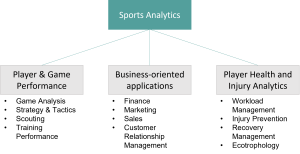Sports analytics has transformed the way teams approach strategy, player development, and performance evaluation. By leveraging data and advanced statistical methods, teams can make more informed decisions that enhance competitiveness both on and off the field. Here’s an in-depth look at the impact of sports analytics on team performance.
Key Aspects of Sports Analytics

1. Data Collection and Analysis
- Player Performance Metrics: Teams collect vast amounts of data on player performance, including metrics like shooting efficiency in basketball, player efficiency ratings in football, and advanced stats in baseball (e.g., WAR, OPS).
- Game Statistics: Analyzing game footage and statistics helps teams understand strengths and weaknesses, informing tactical adjustments.
2. Injury Prevention and Management
- Wearable Technology: Devices that track player movement and exertion levels help teams monitor physical strain, reducing the risk of injuries.
- Health Analytics: Data-driven approaches to player health can lead to better recovery protocols and training regimens, ensuring athletes remain in optimal condition.
3. Strategic Decision-Making
- Game Strategy: Coaches use analytics to develop game strategies based on opponent tendencies and historical performance data. This includes play-calling in football or defensive alignments in basketball.
- Situational Analysis: Analytics can inform decisions in critical game situations, such as whether to go for it on fourth down in football or when to employ a full-court press in basketball.
4. Recruitment and Scouting
- Player Evaluation: Advanced metrics allow teams to assess potential recruits beyond traditional statistics, identifying underappreciated talent and maximizing draft strategies.
- Scouting Reports: Data analytics enhances scouting reports by providing insights into player performance trends and compatibility with team needs.
Case Studies of Successful Implementation

1. Baseball: The Oakland Athletics
- The “Moneyball” approach popularized by the Oakland Athletics revolutionized how teams evaluate talent, focusing on on-base percentage and other undervalued stats to compete with larger budgets.
2. Basketball: The Houston Rockets
- The Rockets have embraced analytics to emphasize three-point shooting and minimize mid-range shots, leading to a significant shift in offensive strategy that has influenced the entire league.
3. Football: The Philadelphia Eagles
- The Eagles’ use of analytics in play-calling and player evaluation contributed to their Super Bowl victory in 2018, showcasing the effectiveness of data-driven decision-making in high-pressure situations.
Challenges and Limitations
1. Overreliance on Data
- While analytics provide valuable insights, an overreliance on data can lead to neglecting the human elements of the game, such as player instincts and team chemistry.
2. Data Quality and Interpretation
- The accuracy of analytics depends on the quality of data collected. Poorly interpreted data can lead to misguided strategies and decisions.
3. Integration with Traditional Coaching
- Balancing analytics with traditional coaching methods can be challenging, especially when some coaches may be resistant to adopting new technologies and methodologies.
The Future of Sports Analytics
1. Artificial Intelligence and Machine Learning
- The integration of AI and machine learning will enhance predictive analytics, allowing teams to anticipate player performance and injury risks more accurately.
2. Enhanced Fan Engagement
- Analytics will also play a role in enhancing fan engagement, with teams providing data-driven insights during broadcasts and on digital platforms to deepen fan understanding and involvement.
3. Global Expansion of Analytics
- As sports analytics become more mainstream, teams worldwide will increasingly adopt data-driven approaches, influencing how sports are played and understood globally.
Conclusion
The impact of sports analytics on team performance is profound and multifaceted. By harnessing the power of data, teams can optimize strategies, improve player health, and make informed decisions that enhance overall competitiveness. As technology continues to evolve, the role of analytics in sports will only grow, leading to further innovations and advancements in how teams operate. Embracing this data-driven culture will be key to success in the increasingly competitive landscape of sports.


